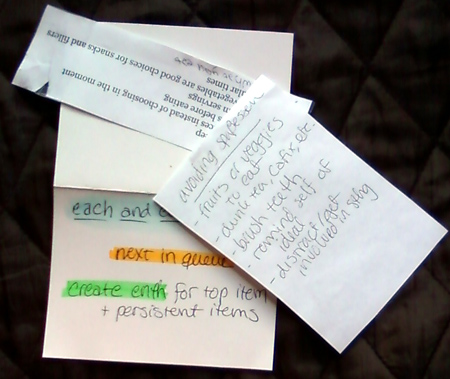
In another article on The Willpower Engine I mentioned the useful mnemonic S.M.A.R.T. (Specific, Measurable, Attainable, Relevant, and Time-bound) for checking to see if a goal is a good one. In this article, I’ll get more specific about goals that seem to be good but aren’t: fake goals.
If it’s not entirely up to you, it’s a fake goal
What do I mean by a “fake” goal? A fake goal is anything you want to have happen that you can’t always make happen by your choices and actions. This is tricky, because often people won’t take responsibility for something that really is within their control (like a child saying she didn’t do her homework because it’s impossible for her to remember it), while at other times things are likely to be within our reach but not within our direct control (like being hired to play with a particular orchestra).
It’s important to sort out real goals from fake goals because fake goals screw us up and cause real damage. For example, if my goal is to become first violin in the Peoria Symphony Orchestra, I might practice obsessively for many years to get good enough to play with the PSO and give an awe-inspiring audition, but if they already have a first violinist who is extremely good, happy with the post, and in good health, that dream might never come about, and I might become depressed, frustrated, and anxious while missing out on amazing opportunities because they don’t match my (fake) goal.
On a smaller scale, I might have a goal of winning a local dance contest, then get upset when the contest judge’s sister-in-law wins it instead.
In both cases, the skills and resources needed to achieve the fake goal are in my hands, but sooner or later it comes to a decision that someone else makes, and as I’ve written about in another article, other people are not under our control in any healthy and meaningful way.
Losing weight: a classic fake goal
One very popular fake goal is losing weight. At first glance, this might seem contradictory. Surely getting fit is under our control? And in large part, it is–but losing weight is not necessarily the same as getting fit.
For example, take my own fitness saga. I got serious about fitness in late 2005 by beginning to log how many calories I was eating each day and starting to exercise regularly. Since that time I’ve lost about 50 pounds. So how is weight not a good indicator? Well, there are two main problems with it. First, there’s the fact that weight isn’t the same as fitness (and neither is BMI, which simply uses your weight and height to come up with a number). In the summer of 2007 I went through a transformation from a relatively heavy guy to a relatively fit guy–and didn’t lose any weight, because as I was gradually losing fat, I was also not-so-gradually building up muscle. And second, weight varies throughout the day and from day to day based on things like water retention, time of day, and the last time you’ve eaten. On the more extreme end of things, yesterday I weighed in several times and found my weight varying five pounds from waking to bedtime!
So if weight isn’t a good goal, why do I pay any attention to it? Because it’s useful information. Often the indications we get of how we’re doing in our progress to our goals are limited or imperfect, but limited and imperfect information is worlds better than no information at all. While it doesn’t convey the complete story of my fitness progress, the fact that I’ve lost 50 pounds so far and am nearing my target weight is one of the clearest indicators I can give myself or others about how things have gone for me.
A bad goal can be a good aspiration
But if winning a contest or losing weight isn’t a good goal, what should we do instead? Give up on goals? Rid ourselves of aspirations?
Definitely not. To motivate ourselves, aspirations (like winning a contest or losing weight) can be powerful tools. In addition to providing valuable feedback, aspirations can fuel our visions of what we want the future to be like, which can be powerfully motivating. However, we need to treat aspirations less seriously than goals. If we’re not achieving our aspirations, there comes a crucial moment when we have the choice of either getting attached to it in a way that will hurt us or surrendering it so that we can focus on other opportunities that might pay off better. What this means is being willing to look at the scale that says I just gained two pounds, reflecting that my diet and exercise have been excellent over the past couple of weeks, and shrugging it off with the thought that unless I’m confused about what I need to do, my progress will show up on the scale sooner or later. It also means looking at the contest I didn’t win or the orchestra position I wasn’t offered and recognizing that there are other contests and other positions, and while the loss or the lack of a job playing violin might be valuable information for me to think over, it isn’t the end or the goal.
Real goals are about what we do, not what we’ll get
The most powerful and productive goals are ones that are connected with a change in habits and the immediate, reliable benefits of what we’re doing. (For example, read about this related research finding.) Instead of having a goal to lose weight, I can (and did) strive to get in the habit of eating more healthily and mindfully and to exercise regularly. My goal in doing these things is to constantly become healthier, have more energy, and improve my mood. I certainly had aspirations of looking better, being strong, and winning Taekwondo sparring matches, but if I had focused on those instead of on progress, I would have been disappointed when I didn’t look much different after the six months, wasn’t noticeably stronger for some time, and lost at my first Taekwondo competition (though I won at my second).
The violinist would be better served by a goal of getting in a certain amount of good practice every week, and the dancer by the goal of perfecting a new dance routine for every competition that comes down the line. Both people are likely to have a lot of aspirations about things they can’t entirely control, especially other people’s opinions of how well they do, but can take these in the context of their specific goals.
When several small goals = one big goal
A note here about multiple goals: in other posts, I’ve talked about the importance of focusing on only one new goal at a time. It would probably be more precise for me to suggest focusing on only one new area of accomplishment at a time, since a violinist could simultaneously be working on the related goals of practicing twenty hours a week, mastering a particular piece, and making certain bowing techniques available by reflex. At the same time, it’s worthwhile to consider whether some goals would benefit from being broken down. For instance, eating better and exercising are complementary parts of an overall fitness goal, but both of them can take a lot of learning, planning, and effort to achieve, and it might work best for many people to get one on track before really digging into the other.
Photo by Dennis Sylvester Hurd.
Like this:
Like Loading...




 Hunger is a widely misunderstood feeling: we tend to think that it’s our stomachs that are mainly responsible for making us feel hungry; that hunger is a signal that something’s wrong in the body and needs to be fixed; that hunger is painful; and that hunger means the body needs food. All of these can be true in some situations, but all can also be misleading or false.
Hunger is a widely misunderstood feeling: we tend to think that it’s our stomachs that are mainly responsible for making us feel hungry; that hunger is a signal that something’s wrong in the body and needs to be fixed; that hunger is painful; and that hunger means the body needs food. All of these can be true in some situations, but all can also be misleading or false.
 My current reading is
My current reading is


